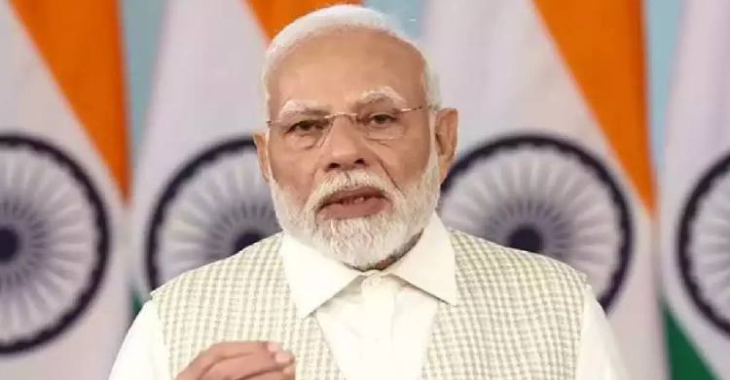As part of the Amrit Bharat Station Scheme, which aims to further modernize the Indian Railways, Prime Minister Narendra Modi will virtually inaugurate 103 renovated railway stations spread across 86 districts in 18 states and Union Territories on Thursday.
More than 1,300 train stations across the country will be converted into contemporary transportation hubs with improved passenger facilities and regional architectural integration as part of the plan.
Major and minor stations in Andhra Pradesh, Assam, Bihar, Chhattisgarh, Gujarat, Haryana, Himachal Pradesh, Jharkhand, Karnataka, Kerala, Madhya Pradesh, Maharashtra, Puducherry, Rajasthan, Tamil Nadu, Telangana, Uttar Pradesh, and West Bengal are among the 103 stations, which were renovated at an estimated cost of Rs 1,100 crore. They are spread across 86 districts.
On Thursday, PM Modi will visit Bikaner, Rajasthan, to lay the groundwork for several development projects totaling over Rs 26,000 crore.
During his visit, the Prime Minister will visit the recently renovated Deshnoke railway station after praying at the revered Karni Mata Temple in Deshnoke. The Amrit Bharat Station Scheme has redesigned 103 stations, including this one.
PM Modi will also launch the new Bikaner-Mumbai Express train during the occasion. Throughout the visit, he would be accompanied by Rajasthan Chief Minister Bhajan Lal Sharma.
Railway stations all around the nation are being renovated as part of the Amrit Bharat Station Scheme to provide improved passenger amenities, Divyangjan (those with disabilities) accessibility, and culturally rich designs.
Amgaon, Chanda Fort, Chinchpokli, Devlali, Dhule, Kedgaon, Lasalgaon, Lonand Junction, Matunga, Murtizapur Junction, Netaji Subhash Chandra Bose Itwari Junction, Parel, Savda, Shahad, and Wadala Road are among the Amrit stations being inaugurated in Maharashtra.
Goverdhan, Govindpuri, Hathras City, Balrampur, Bareilly city, Bijnor, Fatehabad, Gola Gokarannath, Idgah Agra Junction, Izzatnagar, Karchana, Mailani Junction, Pokhrayan, Ramghat Halt, Saharanpur Junction, Siddharthnagar, Suraimanpur, Swaminarayan Chhapia, and Ujhani will all be inaugurated in Uttar Pradesh.
The PM will launch the Amrit Bharat Station scheme, which includes stations in Tamil Nadu including Chidambaram, Kulitturai, Mannargudi, Polur, Samalpatti, Srirangam, St. Thomas Mount, Tiruvannamalai, and Vriddhachalam Junction.
Dakor, Derol, Hapa, Jamwanthali, Jamjodhpur, Kanalus Junction, Karamsad, Kosamba Junction, Limbdi, Mahuva, Mithapur, Morbi, Okha, Palitana, Rajula Junction, Samakhiyali, Sihor Junction, Utran Katni South, Narmadapuram, Orchha, Seoni, Shajapur, and Shri Dham stations in Madhya Pradesh will also be inaugurated. These are the Amrit stations in Gujarat.
On Thursday, the PM will also signal the start of the Bikaner-Mumbai fast train.
Notably, Indian Railways is moving quickly to electrify its entire network, which would improve the efficiency and environmental friendliness of train operations.
Railway stations all around the nation are being renovated as part of the Amrit Bharat Station Scheme to provide improved passenger amenities, Divyangjan (those with disabilities) accessibility, and culturally rich designs.
At a cost of Rs 1,100 crore, 103 stations would be modernized and inaugurated by the prime minister. Fatehpur Shekhawati, Deshnok, Bundi, Mandalgarh, Gogamedi, Rajgarh, Govindgarh, and Mandawar-Mahua Road are eight of these stations in Rajasthan.
Temple-style arches and ornamental pillars are just two examples of the local architectural traditions that have been included into the design of the Deshnoke station.
The Prime Minister will dedicate the electrification of important railway sections, such as Suratgarh–Phalodi (336 km), Phulera–Degana (109 km), Udaipur–Himmatnagar (210 km), Phalodi–Jaisalmer (157 km), and Samdari–Barmer (129 km), as well as lay the groundwork for the 58 km Churu–Sadulpur rail line.
The Prime Minister will introduce road infrastructure projects that will improve national security and civilian connectivity.
This entails extending NH-11 and NH-70 as well as laying the groundwork for three vehicle underpasses on NH-58 in Pushkar.
He will also dedicate seven significant national highway projects totaling Rs 4,850 crore, which are anticipated to enhance military mobility and stimulate the local economy.
India’s dedication to clean energy will also be emphasized during the prime minister’s visit. He will lay the groundwork for a number of solar power projects, such as a 100 MW project by SJVN in Nawa and a 300 MW ground-mounted solar project by NEEPCO in Bikaner.
Additionally, solar projects will be started in Kuchaman and Didwana. To improve grid connectivity, transmission networks under Powergrid’s Sirohi and Mewar divisions are scheduled to be introduced.
In addition, he will officially launch three major power infrastructure projects: the increase of the Fatehgarh-II Power Station’s capacity, the Power Grid Neemuch Transmission System, and a power evacuation project in Bikaner.
Supported by domestic solar PV modules under the “Make in India” initiative, the 500 MW Kalasar and 300 MW Shimbhu Ka Bhurj solar power plants, among other projects, would be crucial in bolstering India’s renewable energy framework.
With a total expenditure of Rs 3,240 crore, the Prime Minister will begin the Rajasthan State Highway Development Program, which will upgrade and maintain 12 state highways totaling 757 kilometers, further enhancing regional connectivity.
Notable routes are Dantiwada–Pipar–Merta City (SH-21), Beawar–Tehla–Alniyawas (SH-59 & SH-104), and Mangaliyawas–Padukalan (State Highway-102).
In order to better connect industrial and border areas, plans are in place to upgrade an additional 900 km of roads, including the Gotan–Sathin Highway.
The Prime Minister will also open four new nursing schools in Rajsamand, Pratapgarh, Bhilwara, and Dholpur to strengthen the state’s healthcare system.
These establishments will enhance access to high-quality medical education throughout Rajasthan and support the development of the healthcare workforce.
To enhance electricity distribution in the area, two electrical substations will also be opened: 132 kV GSS Sarda in Udaipur and 132 kV GSS Rajpura in Bikaner.
In order to guarantee a steady and dependable energy supply throughout Rajasthan, these improvements are essential.
Read More


